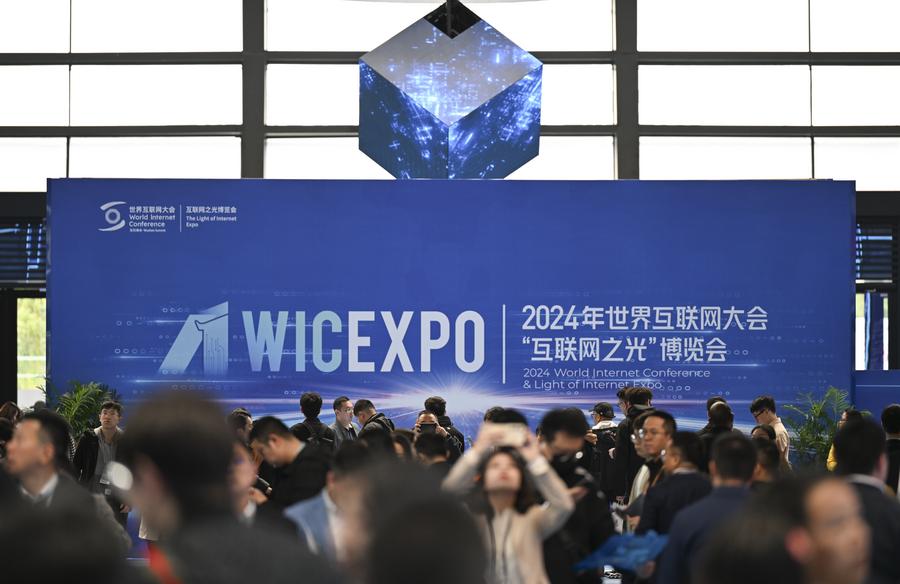


People visit the Light of Internet Expo in Wuzhen, east China's Zhejiang Province, Nov. 19, 2024. The Light of Internet Expo kicked off on Tuesday during the 2024 World Internet Conference (WIC) Wuzhen Summit in the water-town of Wuzhen, showcasing the latest technological achievements, especially those made in the artificial intelligence (AI) area. (Xinhua/Cai Xiangxin)
by Xinhua writers Ye Ting and Zheng Keyi
HANGZHOU, Nov. 21 (Xinhua) -- China is home to almost 10,000 digitalized workshops and smart factories nationwide, according to a report released by the Chinese Academy of Cyberspace Studies on Thursday, highlighting the transformative role of artificial intelligence (AI) in driving industry digitalization.
Among these, 421 have been cultivated as national-level smart manufacturing demonstration factories, 90 percent of which have applied technologies such as AI and digital twins, said the China Internet Development Report 2024, which was released during the ongoing 2024 World Internet Conference (WIC) Wuzhen Summit held in the ancient water town of Wuzhen in east China's Zhejiang Province.
The report analyzed China's developments, achievements and future trends in information infrastructure, digital economy, cybersecurity and law-based cyberspace governance.
The report also noted that by the end of 2023, the number of valid AI invention patents in China had reached 378,000, representing a year-on-year growth of over 40 percent -- 1.4 times the global average growth rate.
From 2014 to 2023, China filed over 38,000 generative AI patent applications, ranking first globally. Generative AI applications have entered a phase of rapid growth, with more than 100 large-scale models with over 1 billion parameters in China as of March 2024.
AI continues to expand its applications across industries, with sector-specific large models empowering fields such as electronics, health care, and transportation. This has led to the development of hundreds of application models, driving digital transformation and upgrading traditional industries.
For instance, Alibaba Group is committed to making its self-developed large models open source. To date, over 100 open-source models are available on Qwen, Alibaba Cloud's proprietary language model, with cumulative downloads exceeding 40 million, said Wu Yongming, CEO of Alibaba Group, at the summit.
As of the end of this September, more than 8 million developers are actively engaged in model development and application on Alibaba's AI open model community "ModelScope." Making these models open source has significantly lowered the barriers for AI development and adoption across various industries, accelerating the implementation of AI in diverse scenarios, said Wu.
Likewise, the ERNIE Agent developed by Baidu has significantly advanced the capabilities of Baidu's ERNIE foundation model and driving widespread applications across various industries, which has attracted more than 800,000 developers and 150,000 enterprises, according to Wang Haifeng, Chief Technology Officer of Baidu.
"For example, we collaborated with Academician Zhu Youyong from the Chinese Academy of Engineering and his team to develop the 'Farmer Academician Agent' based on ERNIE foundation model," said Wang, who added that it integrates Zhu's research and agricultural knowledge to provide farmers with real-time assistance on issues such as planting techniques and pest control.
According to data from the market research firm International Data Corporation, the market size for China's large-model platforms and related applications reached 1.77 billion yuan (about 243.8 million U.S. dollars) in 2023.
Also released at the summit, the World Internet Development Report 2024 said the promising outlook for future industries driven by AI has led to significant investment from the industrial circle in AI research.
In 2023, the industrial circle produced 51 prominent machine learning models, compared to just 15 contributed by the academic circle. Limited access to funding, data and computational resources in academics has caused a talent shift toward industry, further solidifying its dominance in AI research and development.
The two reports mentioned above have since 2017 been released for eight consecutive years as outcomes of the WIC.
Themed "Embracing a People-centered and AI-for-good Digital Future -- Building a Community with a Shared Future in Cyberspace," the summit kicked off on Wednesday and is scheduled to conclude on Friday.
点击右上角![]() 微信好友
微信好友
 朋友圈
朋友圈

请使用浏览器分享功能进行分享
